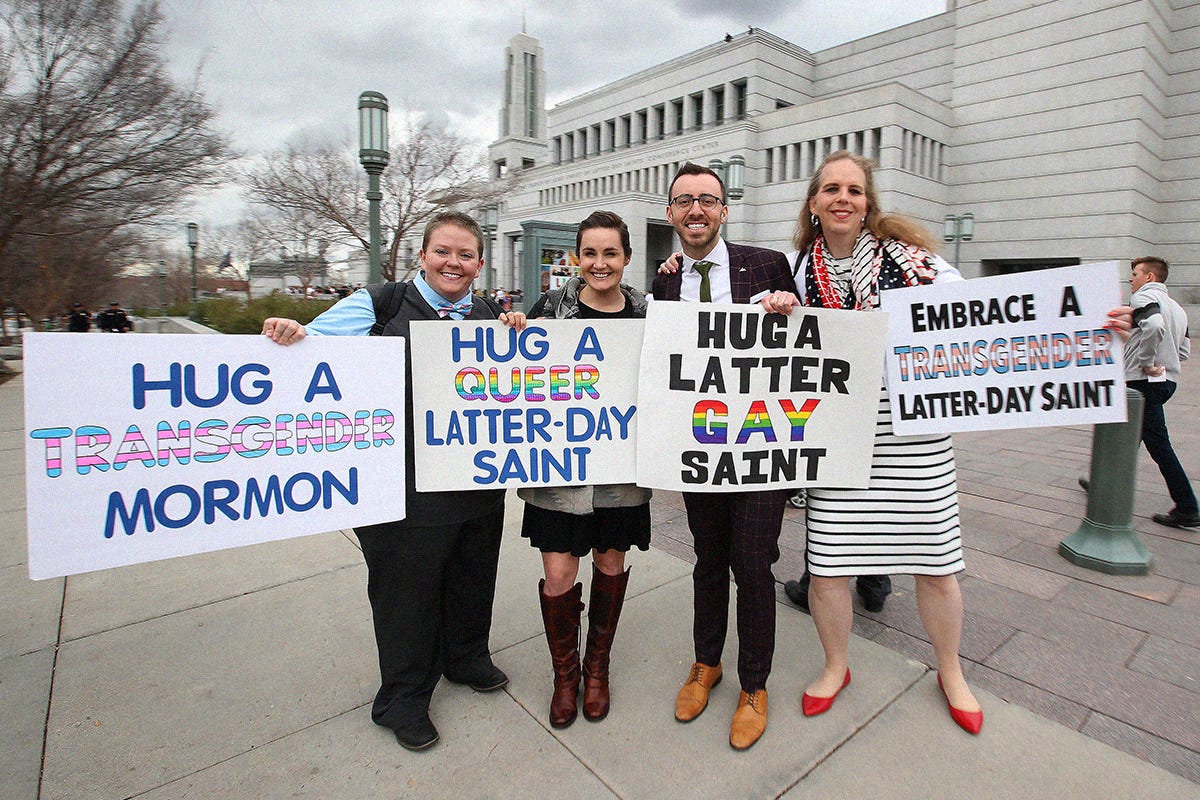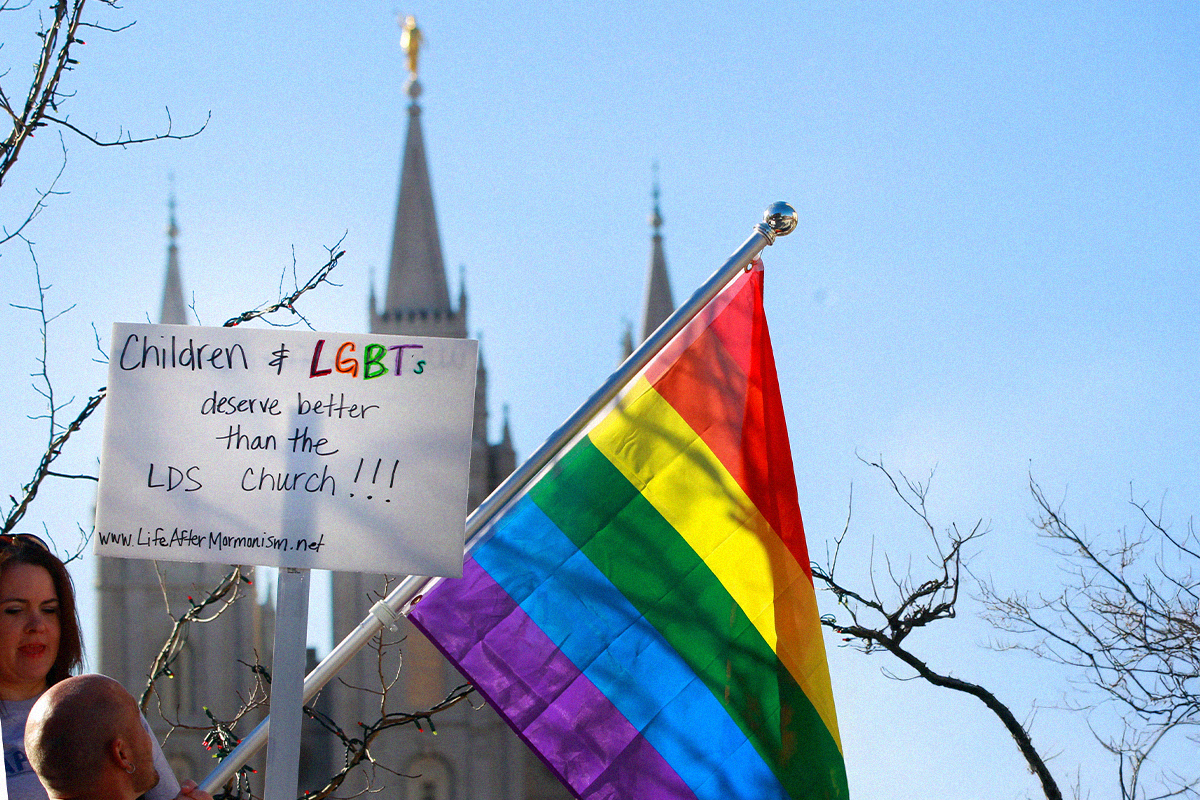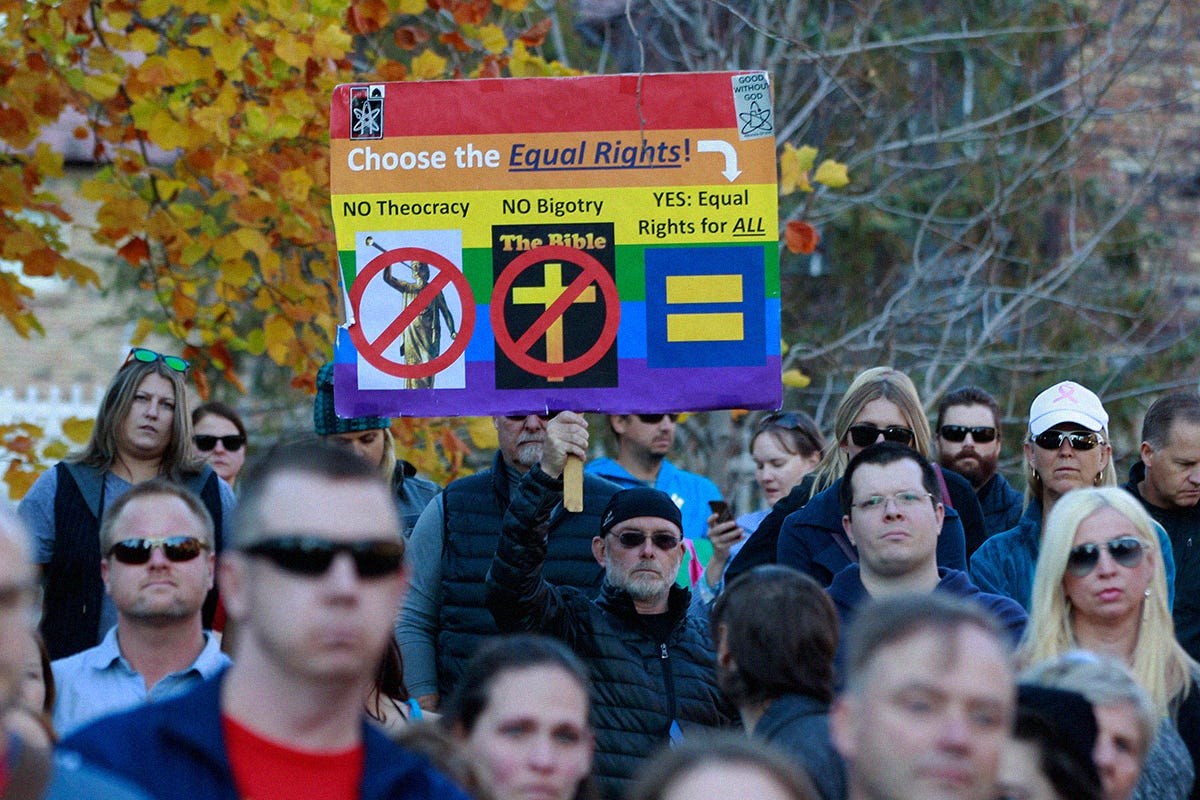Mormon Church: Giving Trans People More Rights Will Make Religious Groups “Second-Class” Citizens
LDS leaders argue that trans equality threatens their “freedom” while advocates say the brief weaponizes religion to justify discrimination.
In its latest strike at the LGBTQ+ community, the Mormon Church has claimed that full trans equality under the law would “undermine religious freedom.”
The assertion appears in a September 19 amicus brief to the U.S. Supreme Court filed in the cases of Hecox v. Little and B.P.J. v. West Virginia State Board of Education, which concern the constitutionality of laws banning trans athletes from competing in alignment with their gender. In July, the Supreme Court agreed to jointly hear the cases during the 2025-2026 term, and an 18-page plea authored by the Church of Jesus Christ of Latter-day Saints argues that, should SCOTUS side with trans athletes, “religious freedom would be less free.”
“Constitutionalizing transgender status will diminish religious freedom by unsettling settled legal rights and protections for religious organizations,” the brief states. “They and their members would face legal and social stigma because their faith teaches that sex and gender are inseparable.”
Among its grievances, the LDS Church claims in its brief that recognizing trans people as a “quasi-suspect class” under the U.S. Constitution may serve to consign “religious people and institutions to second-class status in American life.” In its argument, the church claims that people of faith would be labeled “bigots” and their views likened to racism if the Supreme Court were to decide that discrimination against trans people merits “heightened scrutiny.” Also referred to as “intermediate scrutiny,” such a declaration on the part of SCOTUS would mean that any state law targeting trans people would merit closer review to ensure it does not infringe upon the community’s inalienable rights.
Elsewhere, the LDS Church expresses fear that, should trans rights be constitutionally expanded, it might be forced to hire trans people. “Equality claims would generate conflicts affecting religious freedom in employment,” the brief says. “Novel questions would cast doubt on whether religious organizations can exercise their faith without facing penalties and lawsuits.”
Given the tumultuous history between the LDS Church and the LGBTQ+ community, trans people and their allies say that news of the brief hit them hard. Laurie Lee Hall, a former LDS religious leader who was forced to leave the church in 2015 following her decision to transition, says the church’s statements are “toxic, unsafe, and incredibly harmful.” While she argues that it’s not surprising that the church’s positions have evolved so little since her dismissal, Hall adds that what struck her about the brief is Mormon leadership’s choice to paint themselves as the vulnerable parties in the equation.
“It’s extraordinary to me that they’re using the concern that they don’t want to be marginalized and they don’t want to be looked at as bigots, so they need the courts to continue to protect them so they can continue to go about being transphobic bigots,” she tells Queer Agenda. “This language of this just amazes me, that they cry about the attitude of the public chilling toward themselves as religious organizations, when in reality, it’s their own behavior.”
The brief isn’t the first time that LDS leadership has taken a public stance against LGBTQ+ rights. Shortly after backing Utah’s LGBTQ+ nondiscrimination law, the church released a controversial proclamation in November 2015 branding the children of same-sex couples as “apostates.” It also barred them from being baptized in the LDS faith until they disavowed their parents’ marriage. The policy, which was largely viewed as retaliation against the Supreme Court’s historic ruling on marriage equality just five months earlier, was partially repealed in 2019, but in the years since, the church has made numerous controversial, anti-LGBTQ+ moves. Among them, LDS leadership issued new guidance in August 2024 prohibiting trans members of the church from working with children or serving as teachers.
While the LDS Church did reverse its one-time opposition to marriage equality by publicly backing same-sex marriage rights in November 2022, the very same year it authored a separate amicus brief to the Supreme Court supporting a Christian website designer who believes her faith should preclude her from being forced to provide services to gay weddings.
Elle Mills, a scholar on religion who left the LDS faith when she was 18 years old, says this month’s Supreme Court brief “felt like just one more nail” after so many blows from the church. “The messaging that they send repeatedly through things like this is: Your existence is a threat to us,” Mills tells Queer Agenda. “That’s really what I got from this amicus brief, that my existence as a trans person is an affront to their liberty. What a message to be sending to youth who struggle to try to reconcile their faith with what they feel and know about themselves.”
The LDS Church’s amicus brief arrives at a particularly fragile time both for the LGBTQ+ community and the church itself. Amid the second Trump administration, trans people have found themselves under constant attack, whether regarding their access to necessary health care, right to obtain accurate passports, or ability to serve openly in the military. More recently, Trump’s White House has sought to restrict trans people’s Second Amendment rights to possess firearms and to classify members of the community as terrorists. And over the weekend, an LDS Church in Grand Blanc Township, Michigan, was reportedly targeted in a deadly mass shooting. The assailant was reportedly a former Iraq War veteran and apparent Trump supporter.
Some LGBTQ+ people and their supporters worry about the further traumas that the brief could cause for communities that are already grieving. Lisa Tensmeyer Hansen, the clinical director and founder of Utah-based Flourish Therapy, Inc., says that research has consistently shown that religious groups publicly opposing equality increases “depression, anxiety, and suicidality” among the LGBTQ+ community, particularly youth. Following the November 2015 proclamation on same-sex families, LGBTQ+ support groups reported that more than 30 young people took their own lives in less than three months’ time.
“The LDS church still has many members who are gender diverse and trying to maintain their faith, and they hear this as the church actively lobbying against their mental and physical health, reinforcing the rejection they’re already navigating,” Hansen tells Queer Agenda. “We know what thwarted belonging does. It’s one of the major factors in suicidal ideation. It starts that ideation rolling, of feeling like I really don’t belong, and I fear that happening with the message that this amicus brief is sending.”
It remains to be seen what impact, if any, the LDS Church’s brief will have on the Supreme Court’s deliberations on the trans athlete cases set for its docket. The conservative-majority court has not yet announced a formal date to begin hearing oral arguments, but proceedings are likely to begin by the end of the year. The most recent trans rights case before the Supreme Court, United States v. Skrmetti, resulted in a narrow victory for states that wish to restrict the ability of minors to access gender-affirming treatments like puberty blockers and hormone replacement therapy.






